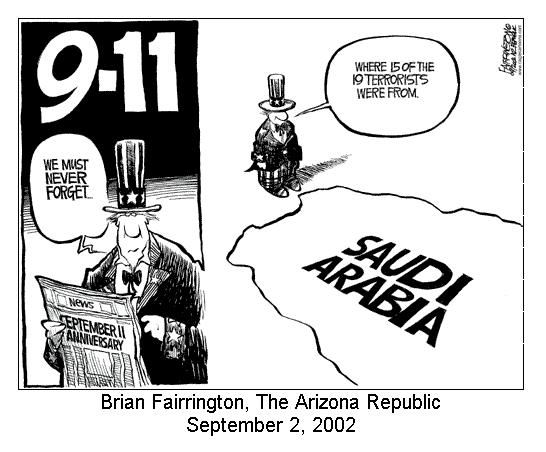Links
Archives
A website revolving around the social and economical injustices brought about by Globalization. Also, questioning if Globalization does in fact exist or just a progression from 18th Century imperialism?
Friday, July 16, 2004
The affects of Globalization on Saudi Arabia
Saudi Arabia is at a crossroads with disastrous repercussions whatever path it decides to go down. A Catch 22. Should the political landscape of Saudi Arabia remain Conservative or should it give over to modernisation? More to the point, what has brought the sudden urgency for this debate in a country that is steeped with strict homogenous Sharia law (despite tribalism)? There are many possible answers to why change is happening: historical, economical, social, religious or cultural, but whatever it is, it is certainly complex and uncertain.
The Reformists argue that in order to reach security and stability in a country, you first need to have democracy that gives individuals a social responsibility as well as a form of participation that in turn gives an incentive to conform to the norms of society. This is the brunt of their argument, but aren't neglecting many other concepts of which they're calling for in the name of modernization. Universal Education, woman’s rights, redistribution of wealth based on social justice, municipal elections (that have been promised in October 2004) as well as General Elections and changes in the judiciary. Their explanation, or their reasoning, for this transformation is that it will create economic growth (full employment) social harmony (eradicate revolutionary tendencies), religious tolerance (the freedom to worship) and cultural diversity (the liberalisation of Sharia Law for more individual agency). All resulting in a much stronger and powerful Saudi Arabia that can compete more in global markets instead of depending on oil. Radical Reformists see the Conservatives (especially those in power) as elitist, secretive and fascist and find the ill-treatment of dissidents as repugnant. Whilst the Royal Family hold the high majority of national income while the rest of the country live in dire poverty, they feel reform is necessary. They also see contradictions in the “religious” authority of the Royals, considering they've been heavily westernised and only kept in power with US oil money.


The Conservatives however, see things differently. they have a tendency to see things more in a historical context whilst Reformists are fairly contemporary. Wahhabism, a strict puritanical and ironically, reformist Islamic movement from the 18th century, still manages to influence the ideologies and polity of Saudi Arabia. Which proposes that Sharia Law remain resolute in the order of state-hood. This can include female subordination and Jihad upon infidels. So, while reformists view policies from a social point of view, Conservatives by nature, view it from a religious paradigm. The Current Royal Family, headed by Crown Prince Abdullah boasts of it's 4,000 princes and having a 70 year dynasty within Saudi Arabia, the authority they exercise is meant to embody the true Islam, so any notion of reformation or change is an alteration on Islam itself. Common criticisms against Reformists by Conservatives and a percentage of the populace alike are:
"Saudi Arabia is a very tribal society, democracy would make a bigger mess"
"we are not ready to vote ...we don't even have basic human rights yet"
"Saudi Arabia has the two holiest sites in the world, it has an obligation to Sharia Law"
"We want evolution [towards reform], not revolution"
(This World, BBC, 2004)
To put these two political ideologies of Saudi Arabia into practise, it would be wise to put them in the context of Global Terrorism. How does a Saudi Reformist view the current action of Terrorists within Saudi Arabia and how do they propose to prevent it? How does this approach differ from the Conservative approach?
A Reformist would tend to blame the Wahhabist influences within Saudi Arabian society. The strict religious teaching has, in their eyes, the same affect on Saudi citizens as the indoctrination Palestinian children experience who ultimately end up as suicide bombers. Unemployment as well, is a major factor. Much like the recruitment tactics used by Al Qaida in Pakistan, where they tempt the impoverished, the homeless and jobless with an income, food and shelter in return for terrorist activity. Or in Northern Ireland, where the IRA signed up the jobless Catholic youths (systematically unemployed by the British government). Terrorists are predominantly unemployed young men, sought after for their vulnerability and naivety. Reformists would propose Democratisation as a form of solution to combatant Terrorism. This approach would marginalize the fundamentalists. Coupled with social initiatives towards full employment and a welfare state that is sustainable will eradicate the accessibility of young men by Terrorist leaders.
Conservatives will tend to blame western impositions. The "cultural imperialism" of America in Riyadh and the other major cities, with McDonalds, Starbucks, Disney and Hollywood Cinema is considered a rape of indigenous heritage and religious piety. The presence of American Army bases on Saudi soil (as a result of "Desert Shield", a program that was meant to last until the end of the Gulf War, but still continues) is seen by Islamic clerics as the infidel on holy land. Not to mention the large inclusion of foreign workers within Saudi Arabia, helping to construct and maintain city and industrial businesses. Conservatives will say that religious fundamentalists are reacting to this invasion and any western involvement inside Saudi borders is fuel to this retribution. The solution, is to be more totalitarian than they already are, to provide a disincentive to be dissident or reign terror. This is happening with the imprisonment of Imams on suspicion of inciting religious hatred. However, these radical conservatives shouldn't be mistaken for the Saudi government or the Royal Family themselves. In part, it's the executives of Saudi Arabia that have asked for Western involvement.
This discourse between Conservatives and Reformists is a fairly recent phenomenon in Saudi Arabia. Why now? Is it because of recent events that are happening inside the nation-state itself or events from outside? By using the example of Terrorism, it not only helps exemplify how something can be seen very differently from two different view points. But also that this "something" isn't exclusive to Saudi Arabia, but actually global. The world-network of terrorism is affecting national politics and modifying its policies. Just one instance of how Globalization is affecting Saudi Arabia.
Some more examples can include the Economy. Since Iraq and it's oil fields have now been colonized by America, does that mean the dependency on Saudi oil by the US that the Royal Family once enjoyed, has been greatly reduced (or diminished entirely)? If so, reform has to be implemented to cope with this sudden downfall in revenue.
Cultural Globalization, some may say, has created an urgency for reform. With the Westernization of cultural products and it's associations with liberty and freedoms, has this implanted the seed of hope in the women wearing burkahs? Because of the availability of Global media and Satellite communication networks, making it possible for Saudi citizens to understand the concepts of the West, does that make them envious of Western freedoms?
Political Globalization, or more specifically, relations with the West, must also have played its part in the sudden calling for change. When Saudi Arabia was betrayed by Saddam Hussein in 1990, King Fadh turned to America for military security against Iraq in exchange for a "substantial financial payback". Ever since, US troops have remained in Saudi Arabia. The Mujahadeen in Afghanistan to, a primarily Saudi movement in the 1980s with Bin Laden as protagonist was heavily funded by America to fight off the Soviet advances. Again, militarily, dependency was on America. Although this was by no means a good will gesture by the CIA, but a strategic plan to carve enclaves within the Middle East to manipulate oil production and oil prices. Has this history of American “friendship” brought about a need to change the way Saudi Arabia views itself?
The relationship between America and Saudi Arabia as a trans-national partnership (security in exchange for oil and money) will have affected national sovereignty in that the Saudi Government can't be seen to criticize the US state or any US government in office at the time, less they want to lose American security. In exchange, the US can't be heard to criticize the human rights issues within Saudi Arabia unless it felt it could survive without Saudi oil surpluses.
All of these global movements and events involving Saudi Arabia have happened very recently. They have thrust the nation-state into a global network and thus, forcing the country to modify itself to cope with the changes (in oil price mechanisms, cultural diversification, western penetration, political alliances). As a result, calls for reform escalate in tune with the intensification of globalization.
However, this path which leads us to the current debate: Should Saudi Arabia modernize its institutions and infrastructures? was made urgent by the global epoch of September 11th. 15 of the 19 Terrorists involved were of Saudi descent. The leader was Osama Bin Laden, a Saudi born Islamic fundamentalist and notorious to CIA. Although the attacks on America weren't unprecedented (WTC bombing in 1993, 2 US embassy attacks in Africa in 1998, Al Qaida bombing of the USS Cole in 2000), the extent was much more dramatic and global. Involving a multitude of international victims, the four pilots were of four different nationalities, the target was the "World" Trade Centre and the country was the epicentre of Globalization itself: America. Not forgetting the retribution, which was a global coalition. This global coverage and seemingly international importance made anyone who was involved with the Terrorist attacks, instant targets. When 79% of the Terrorists involved come from Saudi Arabia, this has put added onus on the immediacy for change, because if the Royal Family continue with it's conservative political values, it will seem to the international community, that Terrorism will continue and that Saudi Arabia is its nucleus.
In summary, it seems that the question that began the essay, Should the political landscape of Saudi Arabia change? it denotes an ethical answer, of which this is not an ethical assignment. But in order for Saudi Arabia to survive economically, culturally, and politically, then Yes, it must change urgently. It should reform to meet the new demands of globalization or else, lose it's importance as a competing nation-state as well as its religious significance. To juxtapose this with the cultural imperialism from the West, this will have an inevitable and adverse affect which will destroy any hope for growth and improvement, since the historical evidence of this hybridization of West meets Middle East has been catastrophic.
So the change that should be brought about isn't black or white, but, as I said in the introduction, "complex and uncertain". Whether Reformists would dissolve religious involvement from state control and if that would be a good thing or not, is open to debate. Whether or not Conservatives will keep it's stranglehold over its populace will mean stability and security, is also up for discourse.
